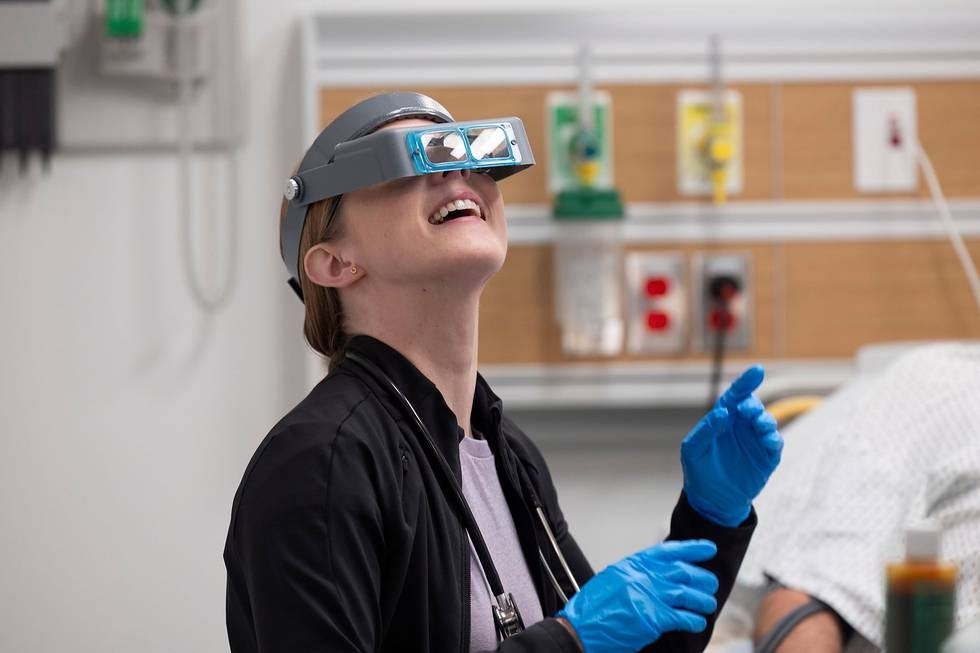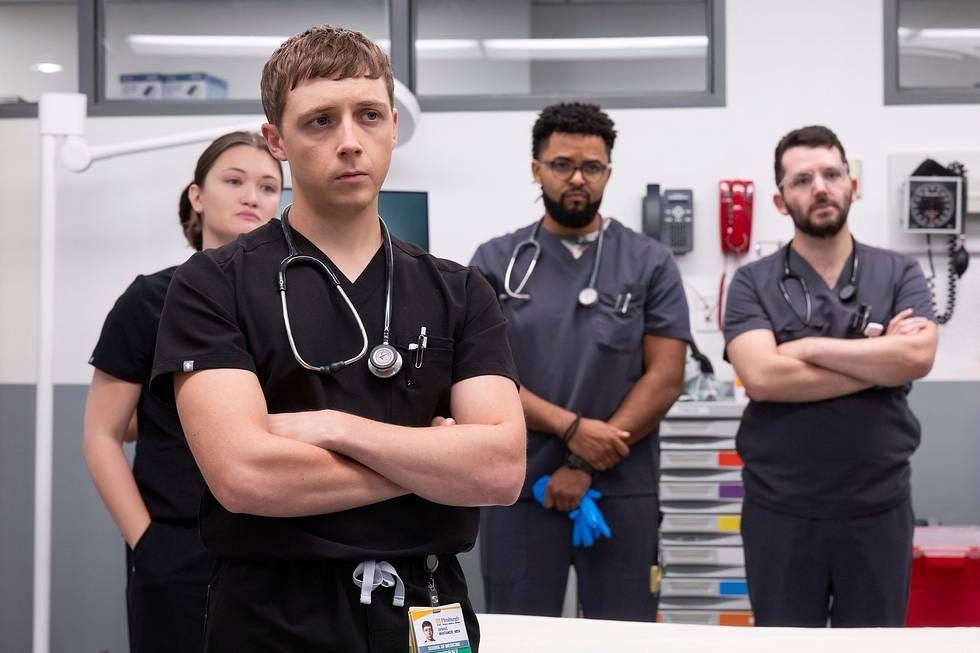This Episodic Reaction comes to free subscribers of the newsletter weekly. To receive future reactions and learn more about the other shows we’re covering week-to-week, become a free subscriber.
TV shows responded to the pandemic in various ways. Many didn’t acknowledge it, and others took a direct approach, shooting an entire episode over Zoom (hello, Mythic Quest). Now, nearly five years after lockdown began, we have reached a point where television explores the long-lasting ramifications. During press for The Pitt, Noah Wyle has repeatedly said that the idea was born during quarantine. This alone sets it apart from ER (speaking of which, there is an update on the lawsuit against The Pitt creative team). As we can see in “3:00 PM,” the impact of this fraught time on first responders goes beyond Dr. Robby’s PTSD and the flashbacks that have been giving additional context. Events in chairs at the start of the episode are rife with reactionary language (“You fucking Fauci zombie,” one woman yells at another) and discord about masks and vaccines.1
The fight is quickly broken up and resets the overall mood after the particularly tough conclusion to the previous episode. It isn’t that “Hour Nine” is a light-hearted affair (this is still The Pitt), but it stresses having to get on with the shift. The waiting room is also a reminder of patients who have been there since the first episode (like Mr. Driscoll) and that the hospital employees inevitably have to play peacemakers along with their actual healthcare roles—see also Dr. Collins with the abortion storyline a few weeks ago. No wonder nerves are fried, and tension is high.
What follows are the observations I took from this ninth episode.
“3:00 PM” is the second episode written by Wyle this season! It is easy to take what Wyle is doing for granted on screen, so I want to highlight a small yet impactful moment when Dr. Robby gathers the team for a debrief after the drowning death. He recalls the first day of his residency at Big Charity in New Orleans, and the moment his voice breaks during this story underscores how closure in this job is a Sisyphean task. It feels accurate that the “pep” talk is interrupted. “You just gave a speech titled ‘How to literally bury your feelings,’” teases Dana soon after. However, this is another moment where Robby’s experience makes him a great leader—even if he doesn’t have the right words to say because they don’t exist.
Speaking of teaching, last week in the comments, there was praise for how the senior staff explains procedures (and how this, in turn, teaches the audience). I agree with this summation, but I also struggled with Dr. Langdon’s huge, unprofessional blow-up at Dr. Santos. This combative back-and-forth has been building. Yet, watching him pull her apart so publicly is unpleasant—especially over something she hadn’t done. Part of me wonders if this is a way to even the scales somewhat, as Santos still leans unsympathetic.2 Or, at the very least, it highlights that Langdon’s approach to supervising Mel is worlds apart. Even after Robby’s dressing down, Langdon refers to Mel as “my least problematic trainee,” showing his bias. Offsetting the personality clash with this lovely scene between Mel and Langdon (and Crosby the dog) reads like purposeful whiplash. Langdon recognizes Mel is struggling after the drowning death, giving her space and then a stress-free road-rash task.
The patient that causes Langdon to resort to shaming, belittling, and insulting is the first to come from PittFest (though probably not the last), and the MDMA overdose offers additional Santos backstory, who witnessed something similar with one of her friends. The tub setup (and sourcing all of the cafeteria’s ice) is a fun touch, showing how resourceful trauma centers must be. Nudity doesn’t come across as gratuitous, and getting insight into these procedures is fascinating.
Even though Nick Bradley’s storyline has ended, a few recurring faces have been around since the first episode: Earl, Mr. Driscoll, and Theresa. Earl is hurt during the waiting room melee and gets front-row seats to Victoria’s extremely awkward attempt at flirting with Nurse Mateo Diaz. She crashes and burns. It is a cringy delight while demonstrating that The Pitt can do romantic interludes within the real-time format. Victoria confides in Dana (like all the smart people on this show) in an interaction that allows Shabana Azeez to show her comedic abilities.
Speaking of Dana, she has many small victories this week that speak to her experience and temperament, which is why the end scene with Mr. Driscoll is so shocking. The violence isn’t a surprise, but the target is: I figured Mateo would be on the receiving end of his fists. Instead, laying that combative groundwork was a misdirect, and it is one of the most unexpected cliffhangers of the season.
“CHiPs! Know your television history,” Dana tells Mateo when he asks who Erik Estrada is. Dana was already a favorite of mine, and then she said these magic words. If it wasn’t already love, it is now.
The incel kid storyline is ticking along, and someone (probably Dr. McKay) has called the cops, much to Robby’s anger. The concerned mother, Theresa, is now talking to the police. McKay’s tendency to make snap judgments or rely on her instincts is a pattern—whether right or wrong. The curious relationship between the assistant and her pregnant boss ends on a sour note, with Piper claiming she is okay. Ambiguity is part of the (purposeful) limitations of the format that never leaves the hospital grounds, and McKay is frustrated with the outcome. It looks like Piper took one of the pens with a hidden hotline number, but we are in the dark about what will happen next. McKay also gets called out on her bias in diagnosing a patient earlier that day, demonstrating her blind spots. McKay doesn’t think she judged the woman because of her weight but concedes that she will look out for this in the future, and this measured response to criticism is welcome.
Hospital resources are limited, but there are workarounds involving street teams. McKay is part of one, and Whitaker volunteers after a second encounter with Mr. Krakozhia. It turns out that the man who peed on Whitaker in the fourth episode (or “10:00 AM”) wasn’t high on meth: he just hadn’t taken his schizophrenia medication (he is unhoused and uninsured). Whitaker covers himself from head-to-toe in protective gear but removes it as Mr. Kakozhia is lucid, extremely apologetic, and ashamed. While their original scene is part of Whitaker getting covered in different fluids (to emphasize how green he is), the resolution is touching. It depicts the horrors of the healthcare system and individuals trying to make a difference. They formulate a workable plan so this doesn’t happen again, and Whitaker’s offer to join the street team is genuine. Howell calibrates Whitaker’s naivety so it doesn’t fall into “aw, shucks” territory with every reaction. I, too, would be thrilled to find out that the street team gets “cool jackets.” There is a second dollop of med student-nurse flirting, and Whitaker is a tad more suave than Victoria.
Whitaker also gets to flex another area of expertise this week: being raised on a farm. The rats are back, and I had mostly forgotten rodents have been on the loose since Episode 2. Earlier, it is adorable that Robby tries (and fails) to distract Dr. Collins so she doesn’t see the creatures she is afraid of, and I might be shipping these two. Having a dog in the ER is another palate cleanser to last week’s trauma, and Crosby (named after David) also serves a practical purpose. Many terriers are ratters, so it makes sense that Crosby beelines for the rodent. Whitaker finishes the job: do no harm doesn’t apply here. The leaping-in reaction indicates Whitaker is growing more confident as the shift progresses, and each med student shows character development. Yes, the Santos journey is bumpy, yet I don’t think they simply repeat story beats. How is everyone else feeling about the med students? In fact, how are you finding the way the overall ensemble is being fleshed out?
Myles here—gotta say, it might just be the PTSD, but something about the mention of Fauci took this out of the contemporary moment? But maybe I just want to believe no one would ever say those things, even if there are anti-maskers who remain.
Myles again—so unsympathetic that my immediate presumption was that she purposefully took the blame to bait Langdon into an overreaction, in order to spark the reprimand. The scene with Mohan largely moves in a different direction, but that was my first instinct.







Other thoughts:
- Maybe this will change over the coming weeks (Wyle's said the third of the season not screened for critics is "an entirely different show", which I'm not sure I'm hyped abt) but it feels like I've had an easier time than most watching the show as something which, despite its pacing, isn't necessarily calling its shots dramatically. Shows like BREAKING BAD have made good TV synonymous with friendliness to a certain meta-narrative critical approach: Swiss-watch tight, no wasted movement, rewarding viewers for "paying attention" (ie, gratifying ppl who scout plot arcs before they complete, or thrilling them with a juke).
I'm not sure THE PITT is doing that. I am probably wrong in my assumption! But I'm getting a lot more out of it when I scale back my expectations of the show's level of contrivance.
When you flirt with a "verite" style, you necessarily list toward "immersion", which is to say, a half-forgetting that everything you see is pre-written and plotted in advance. You start to impose a valence of reality onto the fiction, and as you do so you acclimate your audience, by degrees, to the story developing the way that real life develops: with catharsis and kismet happening rarely, if at all. The more you move away from glitz in style, the more you can get away with in terms of fucking with audience expectation in plot and character, and the less your (smaller but more refined) audience can cry foul when things don't unfold as they expect they might.
Last week I compared THE PITT to HOMICIDE LIFE ON THE STREET, and so far I still think there's a real sympathy between them in temperament: both focus on high-stress work that is alternately crushing and absurd, but more importantly, it's work that *never ends* even when a given case does (in part). That produces a grounding effect on narrative: a restlessness, a lack of satisfaction in going from one plot to the next. It is less about pacing, and more about a flinty long view of the stakes in any given situation. For every solved case or saved patient, there's a cold case or a lost patient.
It's a mode of storytelling which lacks the implied promise common to novels, which is that *this* particular story, out of all potential stories, is being conveyed because it is the capital E Essential excerpt from the gestalt lives of the characters, the story that will bring about monumental change, one they'll remember as well as we do (if they're in a position to do so by the end of it). There's a depth to every quiet beat at the end of an arc on THE PITT or HOMICIDE precisely /because/ while that arc is over in one sense, in another greater sense nothing has ended -- for all the criticality of their work, for however much they care, every character knows that their role in the lives of the people they serve is brief and transient. They know that for their own well-being if nothing else they will, in one way or another, abandon people in immense pain, knowing that there remain needs beyond address; they will be unable even to continue bearing witness. We've seen this happen many times already!
It's rare that you can wake up in the morning and truly say "this is a day that will loom in my mind", rarer still to end one truly satisfied with the differences you've made, and when you face mortality and loss every day, it puts you in a deeply existential place. As Garcia alluded to last week, we are halfway into one day's worth of work in this season. We are meant to understand that everything we see, even with the milestone of students hitting the floor for the first time, will likely be, in the medium- or long-term, a grain of sand in an hourglass. Faces and names will be forgotten, which is all the more dismaying for the few faces and names that are *remembered*.
(The scene with King and Langdon hit for my family -- despite what felt like inappropriate undertones from the latter -- because my mom's a nurse, and her best friend in med school dropped out of medicine early in his career because, working in the ED as spring turned to summer, he was there to see a seasonal surge in drowned children.)
All of this is to say that the commitment to (certain aspects of) realism -- and a close, unshowy style of editing -- can frustrate people who expect precision, economy, and resolution in their storytelling. But it's the precise lack of commitment to those things that allow the existential quality of the work to manifest. Again, I am probably wrong, but I'm hoping that, for example, the Santos / Langdon arc ends tenuously, perhaps painfully, but without the monumental consequences that we might expect from another show. THE PITT might notably overload its shift hourage with a delirious (but more engaging) number of critical cases, but it ought to stay balanced on that "it's one day of many" wire.
The Santos thing made no sense to me. At no point through this season of TV has she come off as someone who would give someone else credit for an idea she had. That whole interaction read to me as the show trying to giver her a save the cat moment out but much later than they should have because they realized they have made her way too unsympathetic. This was the first episode that I felt the seams of a TV show to me